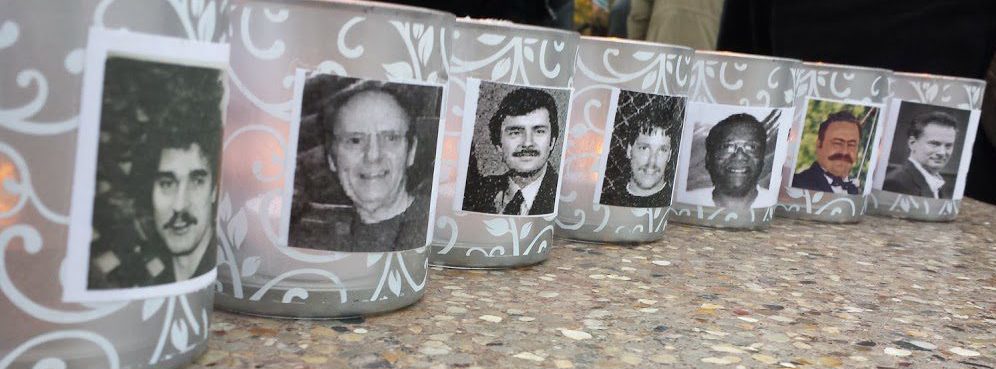For me October 2nd, International Wrongful Conviction Day is a reminder to stay vigilant in a personal mission that came to my attention in 2009—to join a growing movement to vindicate those wrongfully convicted for the tragic death of an employee inside a Green Bay, Wisconsin paper mill.

Front page article with verdicts in the Monfils case on October 29, 1995
Reclaiming Lives: Pursuing Justice For Six Innocent Men, the book I published in 2017, highlights this high-profile case from my non-legal perspective as it reenters the courts twenty years later, based on newly uncovered evidence of innocence. This story which addresses true events and real people whose lives were thrown into chaos when, in October of 1995, six murder convictions befell six of the victim’s coworkers, continues to this day to plague these men, their families, and the surrounding community–all of whom have never fully recovered from the fallout. The path of devastation that ensued following the guilty verdicts, despite a lack of credible evidence or eye witnesses, has become a disease without a cure.

Ten years ago, I committed to staying the course by advocating for these six men and their families. And while I have not been as outspoken lately in regard to this specific journey for justice, I’m still in the fight working hard behind the scenes toward eradicating the misinformation and doubt in the minds of those still unaware of the facts.

4-21-2018 presentation at the Neville Museum In Green Bay, Wisconsin
In the most recent years my colleagues and I were on a roll. We began to feel unstoppable. This mission to reach the public, to disseminate the real truth, and to rally against this injustice had gained more ground than we’d ever thought possible. Support for the six men had risen to proportions well beyond our expectations.

Press conference with local media, July 3, 2019
We were no longer grappling for attention from the media or from the public whose attendance at our local events was slowly on the rise. We were tapping into incredibly lucrative venues. We had a firm grasp on what we had worked so diligently to accomplish on behalf of these men.

This group of ordinary people intent on correcting this injustice, despite having limited resources, had touched a nerve within this community both with those who continued to deny an injustice had occurred as well as those fed up with the status quo who still felt troubled by its many unanswered questions.

3-7-2020 book signing with Michael Johnson at the Lion’s Mouth Bookstore in Green Bay, Wisconsin
I had begun to engage in incredibly well-attended book events with my special and willing guests—the men who had recently been paroled. Folks in the community were excited to meet them, to hear in their own words the long-standing simmering questions that still lingered and still demanded credibility. This was a rarity. And their answers were not the spoon-fed variety that has been reiterated by the Brown County authorities since 1992.
But then COVID-19 hit. And all of our efforts came to a screeching halt.
Judge John Zakowski; the former prosecutor in this case (now a district judge in the same county), recently expressed his belief that these men have everything to lose if they were to all of a sudden confess.
Michael Hirn, one of the six convicted men, wholeheartedly confronted that belief with this fiery reply while participating in one of our book events:
“My response is simple. Who has more to lose at this point? I served almost twenty-four years for a crime I have no knowledge of or participated in. If I came forward now I would probably lose some friends and their support, but that’s it. Now let’s put the shoe on the other foot. If Zakowski came forward and said he wrongly convicted us, what would happen? He currently serves as a judge for the Green Bay community; the same community he lied to all these years by saying we were guilty when, in fact, he wrongfully convicted us. The ripple effect would be huge on this community and career suicide for John Zakowski. So who really has more to lose by actually telling the truth in this case?”
In twenty-eight years, this case has never completely gone away and it never will, for good reason. Most who delve deep into the details come away with searing doubts about the validity of the so-called facts presented by the former prosecutor. The plausibility that six mill workers could turn on a coworker so brutally and so vile, to then continue to lie about it, deny their involvement, and go to great lengths to convince the world that a murder had never even taken place, is highly improbable.
As long as we as citizens refuse to embrace the serious flaws of this “best system in the world” and as long as the authorities who perpetrate these injustices ignore the rules and/or avoid taking the necessary steps to correct past mistakes, we will never fully obliterate this wrongful conviction affliction within our society.
Rest assured we are in uncertain times. But when the opportunities once again present themselves to continue on with this mission, it will be full steam ahead for this crusader with more determination than ever before. Please stay tuned for future activities and updates…
Until then, take care and stay safe!








